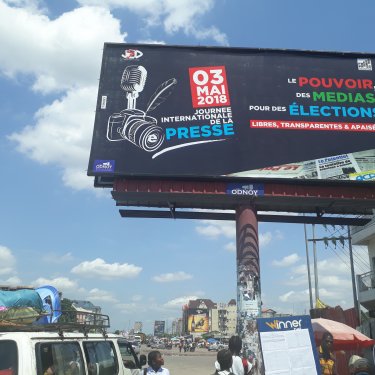RSF and JED decry Congolese government’s “planned system of repression”

Journalist in Danger (JED), the partner organization of Reporters Without Borders (RSF) in the Democratic Republic of Congo, has just released an alarming report about press freedom in the DRC during the past 12 months. Entitled “Journalists and media under pressure: dangerous elections,” it has been published six weeks before a fraught presidential election that was delayed for two years.
JED registered a total of 121 press freedom violations during the 12 months ending 2 November (coincidentally the same number as during the 12 months of 2017). State agents (political, administrative or security officials) were responsible for 77% of these violations although, under articles 24 and 212 of the DRC’s constitution, the state is supposed to guarantee press freedom and protect the media. These acts of harassment against journalists and media outlets are not isolated. On the contrary, they are “part of a planned system of repression designed to silence or remove all those who annoy the regime because they do not hold the same views as its leaders,” JED says.
According to the report, the number of arrests of professional journalists has increased. A total of 15 journalists were held for more than 48 hours during the past 12 months, twice as many as in 2017. They include Tharcisse Zongia, the editor of the satirical newspaper Le Grognon, who has been held for two months. Arrested on 6 September, he has been sentenced to a year in prison on a charge of criminal defamation, the maximum jail sentence for defamation in the DRC. Those recently detained also include five journalists with the tri-weekly newspaper AfricaNews, who were held for an entire day at the headquarters of the police intelligence department in Kinshasa on 19 October after reporting that an investigation was under way into the alleged misappropriation of food at a police training academy.
RSF shares JED’s concern about the harassment of journalists and closure of opposition media outlets in the run-up to the presidential election scheduled for 23 December. RSF and JED also condemn the arbitrary dismissal of three journalists with the state-owned national radio and TV broadcaster RTNC – Syande Emaka, Marie Lelo and Benjamin Okakesema – for covering an opposition demonstration. Documentary filmmaker Gaël Mpoyo and his editor, Franck Zongwe Lukawa, have been in hiding for the past four months, since the screening of their documentary about the eviction of thousands of villagers from land claimed by President Joseph Kabila in the eastern province of Sud-Kivu. The Internet is meanwhile routinely disconnected before and during any major demonstration by civil society groups or government opponents.
Like JED, RSF has noted the Congolese government’s failure to take any action to protect press freedom. No measure has been taken to combat abuses against journalists and media outlets during the past year, despite repeated joint requests by JED and RSF. The DRC continues to use a press law adopted during the Mobutu dictatorship in 1996 that refers cases of defamation and insult to the criminal code, under which they are punishable by prison sentences and heavy fines.
Read JED’s report here.
For any information:
21, av. Nyembo. Quartier Socimat. Haute Cour Militaire
Kinshasa/Gombe. B.P. 633 Kinshasa 1
Téléphone: +243 81 99 96 353 ou +243 99 99 96 353
E-mail : [email protected], [email protected]
Internet : www.jed-afrique.org
République démocratique du Congo



